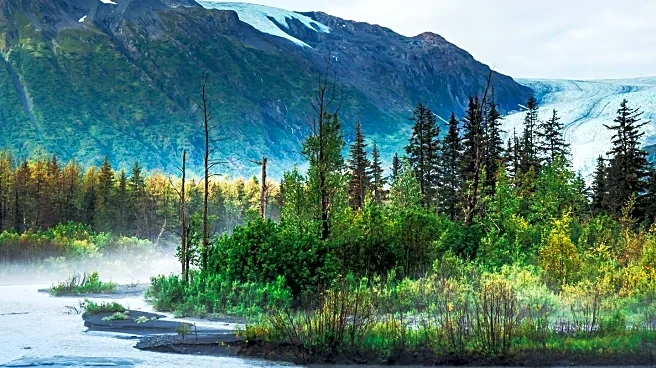What's Happening?
Ben Weissenbach, a writer from Los Angeles, has published his first book, 'North to the Future: An Offline Adventure Through the Changing Wilds of Alaska.' The book is a detailed exploration of Alaska's Arctic, inspired by John McPhee's 1977 classic 'Coming into the Country.' Weissenbach's narrative follows his journey with prominent scientists Roman Dial, Kenji Yoshikawa, and Matt Nolan, as they study the effects of climate change on the region. The book highlights the rapid warming of America's Arctic, which is heating up about three times faster than the global average. Weissenbach documents his experiences trekking across the Brooks Range, observing the northward march of the boreal forest, and learning from the scientists' research on permafrost and glacial changes.
Why It's Important?
The book sheds light on the significant environmental changes occurring in Alaska's Arctic, a region critical to understanding global climate dynamics. As the Arctic warms, it affects not only local ecosystems but also global weather patterns and sea levels. Weissenbach's work underscores the urgency of addressing climate change and the need for comprehensive data to inform policy decisions. The insights from scientists like Dial, Yoshikawa, and Nolan provide valuable information on the impacts of permafrost thaw and glacial retreat, which have broader implications for global climate models and future environmental strategies.
What's Next?
Weissenbach's book may inspire further exploration and research into the Arctic's changing environment. It could also influence public discourse on climate change, encouraging policymakers to prioritize environmental conservation and sustainable practices. The scientific community may continue to build on the data and observations presented in the book, leading to more informed climate action. Additionally, the book's release could spark interest in preserving natural landscapes and promoting awareness of the Arctic's ecological significance.
Beyond the Headlines
Weissenbach's narrative also touches on the cultural and personal dimensions of exploring the Arctic. His reflections on the challenges of paying attention to the natural world in a digital age resonate with broader societal issues of technology's impact on human perception and engagement with nature. The book highlights the importance of fostering a deeper connection with the environment, which could lead to more sustainable living practices and a greater appreciation for the planet's natural wonders.








